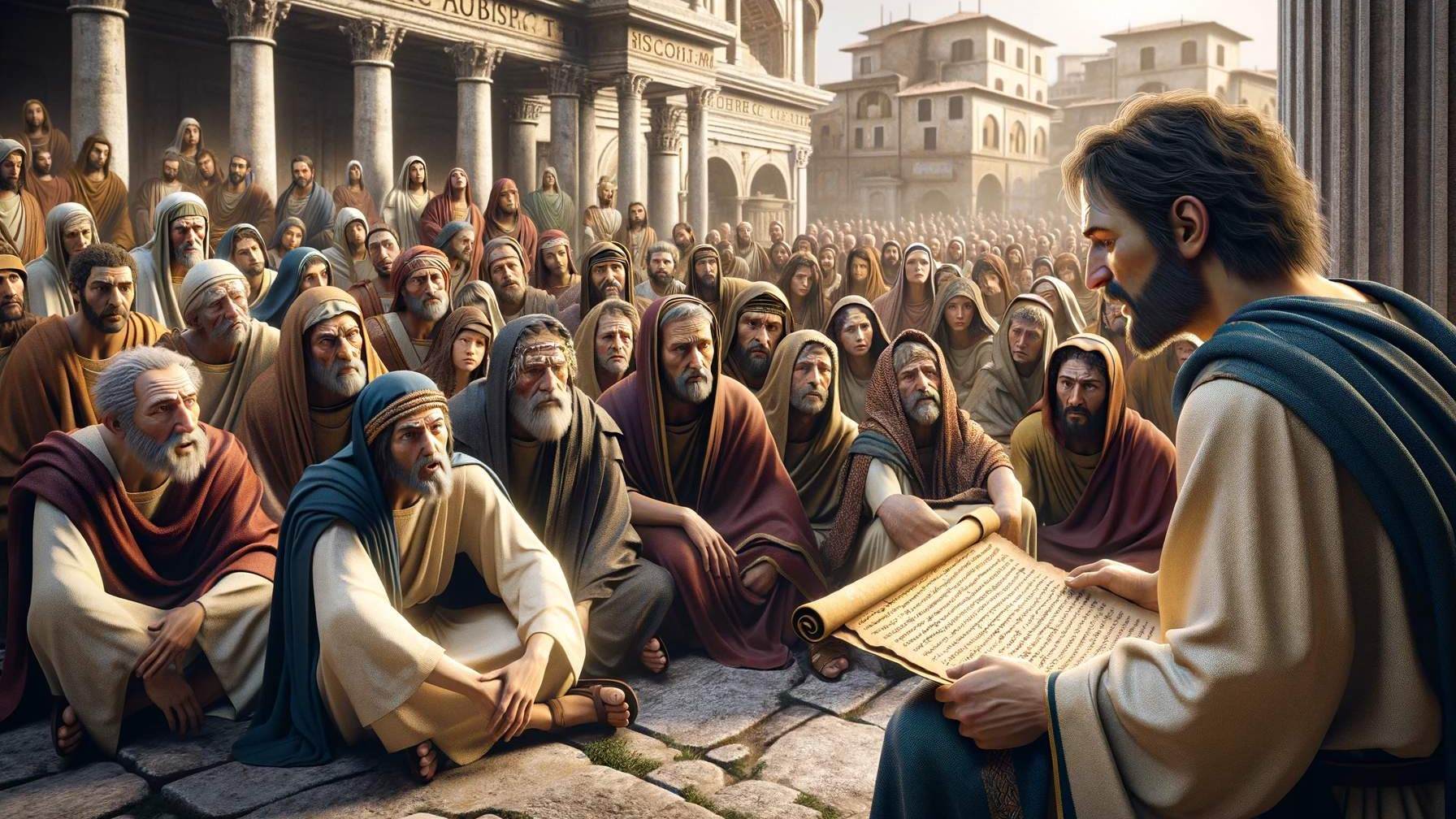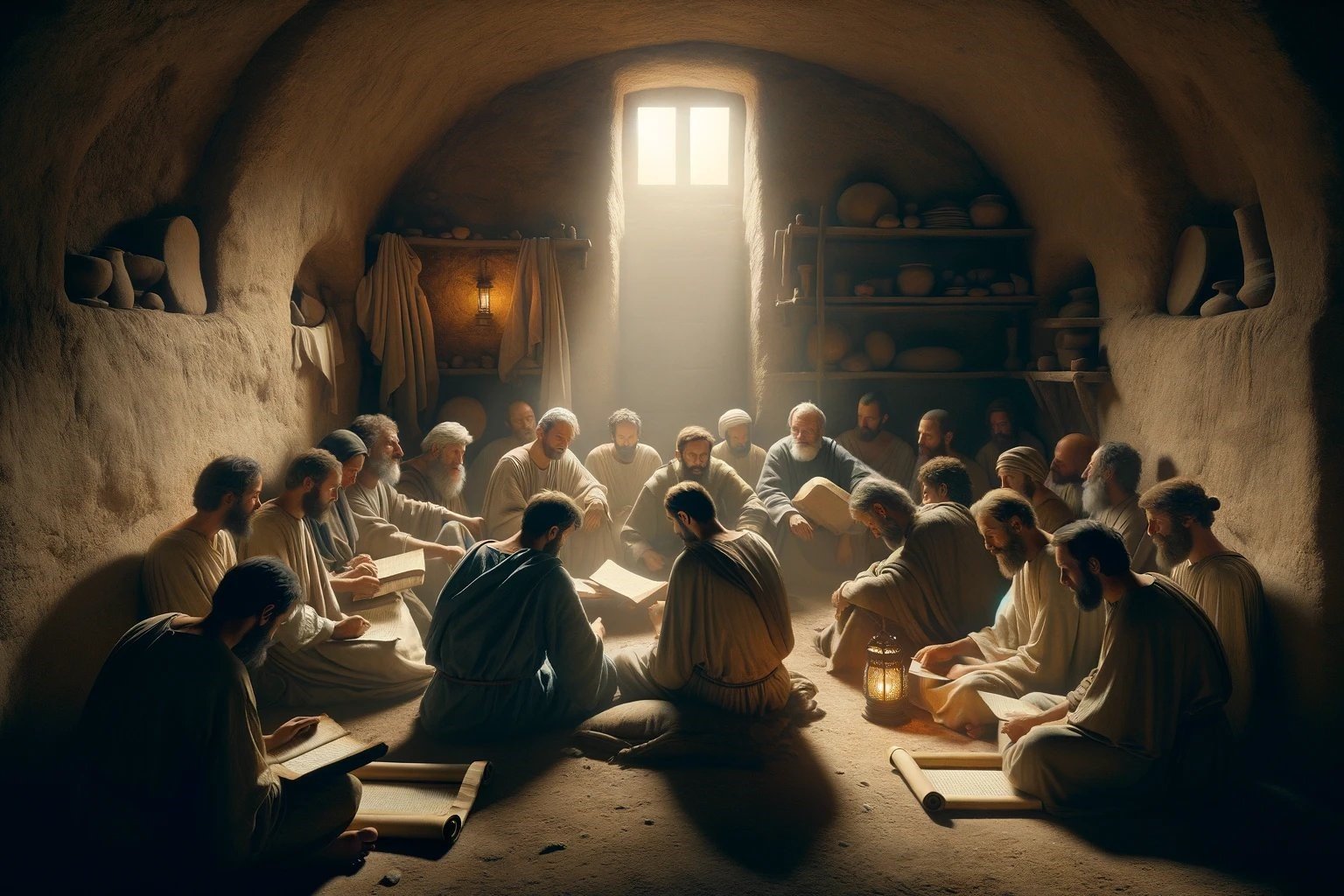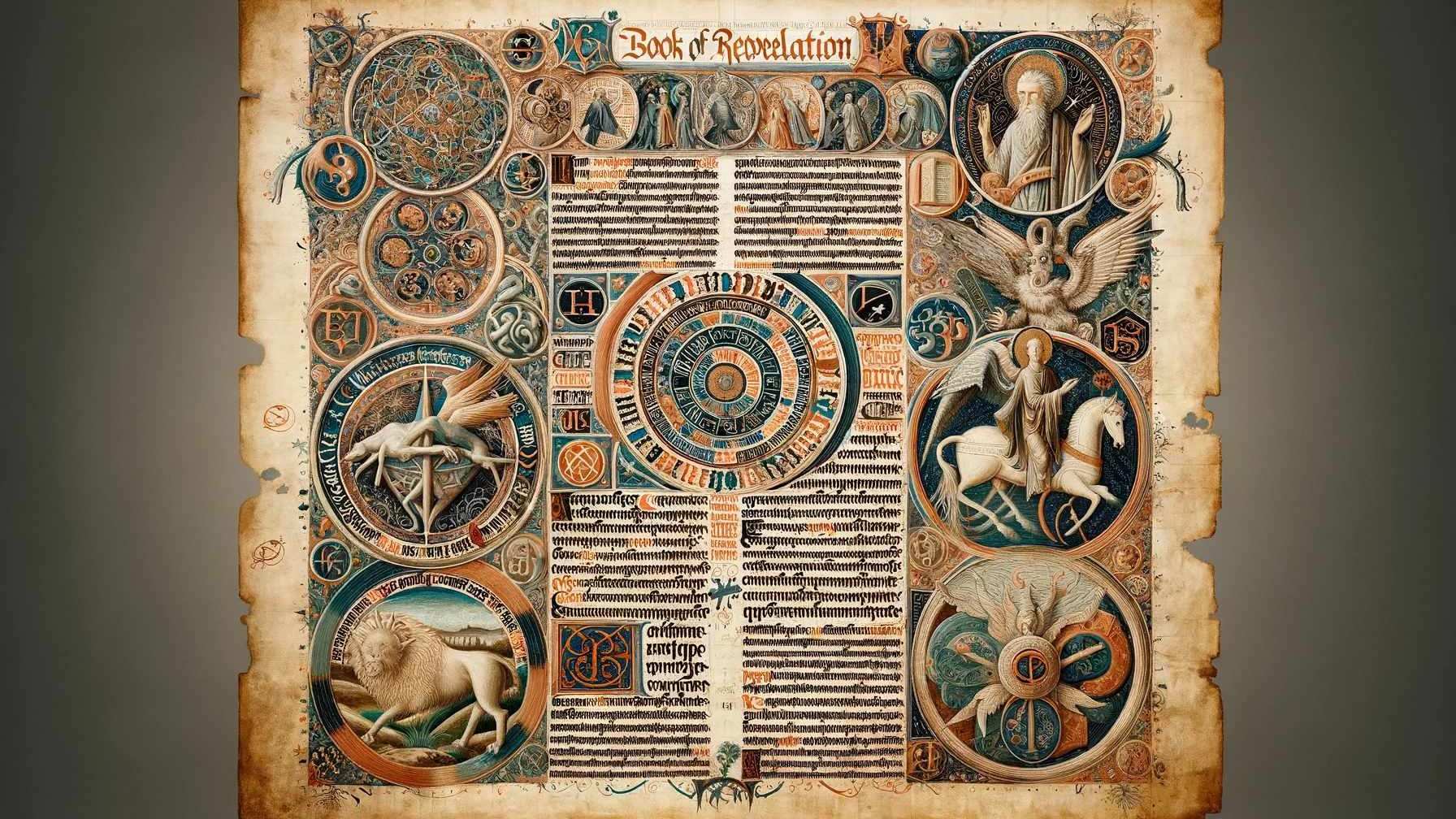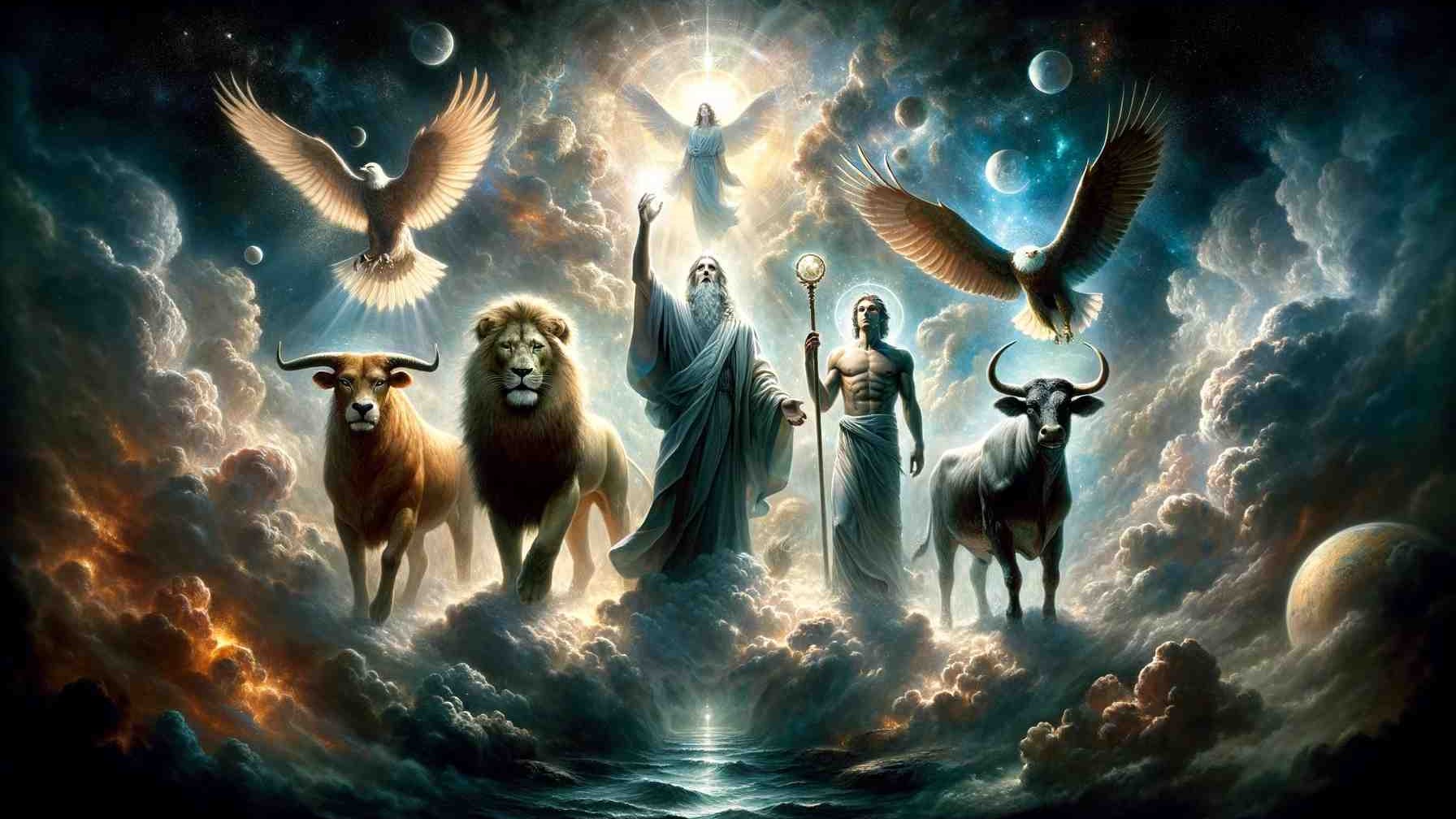Home>Bible Facts>What Was The Purpose Of The Book Of Revelation


Bible Facts
What Was The Purpose Of The Book Of Revelation
Published: February 11, 2024
Jason DeRose, Managing Editor at Christian.net, uses his expertise in religion and journalism to deepen understanding of faith's societal impacts. His editorial leadership, coupled with a strong academic background, enriches the platform’s diverse content, earning him recognition in both journalism and religious circles.
Discover the purpose and significance of the Book of Revelation in the Bible. Uncover fascinating Bible facts and insights.
(Many of the links in this article redirect to a specific reviewed product. Your purchase of these products through affiliate links helps to generate commission for Christian.net, at no extra cost. Learn more)
Table of Contents
Introduction
The Book of Revelation, the final book of the New Testament, is a captivating and enigmatic piece of literature that has intrigued and inspired readers for centuries. Also known as the Apocalypse of John, this profound text is shrouded in symbolism and prophecy, offering a glimpse into the divine mysteries and the ultimate triumph of good over evil.
As we embark on a journey to unravel the purpose and significance of the Book of Revelation, it is essential to approach this ancient manuscript with an open mind and a willingness to delve into its rich historical, cultural, and theological context. This exploration will not only shed light on the intended message of the author but also provide valuable insights into the enduring relevance of this apocalyptic work.
The Book of Revelation is a tapestry of vivid imagery, allegorical narratives, and prophetic visions that beckon readers to contemplate the nature of existence, the cosmic struggle between light and darkness, and the promise of a new heaven and a new earth. Its profound symbolism and cryptic passages have sparked fervent debate and diverse interpretations, making it a subject of fascination for scholars, theologians, and believers alike.
As we embark on this quest to unravel the purpose of the Book of Revelation, we will journey through its intricate tapestry of apocalyptic visions, symbolic imagery, and profound theological insights. By delving into the historical, cultural, and theological dimensions of this ancient text, we will gain a deeper appreciation for its enduring significance and timeless relevance. Join us as we embark on a thought-provoking exploration of the Book of Revelation, seeking to unveil its profound purpose and the enduring truths it holds for humanity.
Read more: What Is Babylon In The Book Of Revelation
Understanding the Context of the Book of Revelation
The Book of Revelation holds a unique place in the New Testament, standing out as a complex and enigmatic work that defies easy categorization. Written by the apostle John, traditionally identified as John the Evangelist, while exiled on the island of Patmos, this apocalyptic text emerged during a period of intense persecution and upheaval within the early Christian community. The historical context in which the Book of Revelation was composed is crucial to understanding its purpose and significance.
During the late first century, the fledgling Christian movement faced relentless persecution under the Roman Empire. The followers of Jesus Christ encountered hostility and oppression as they refused to worship the Roman emperor, choosing instead to remain steadfast in their faith. In this tumultuous environment, the Book of Revelation served as a source of hope and encouragement for the persecuted believers, offering them a vision of divine justice and the ultimate triumph of good over evil.
The author, John, sought to convey a message of reassurance and steadfast faith to his fellow Christians, assuring them that their suffering and tribulations were not in vain. By employing vivid imagery and symbolic language, the Book of Revelation provided a powerful portrayal of the cosmic conflict between the forces of light and darkness, ultimately culminating in the victory of God's kingdom.
Furthermore, the Book of Revelation reflects the influence of various literary and religious traditions prevalent in the ancient world. Drawing upon the rich tapestry of Jewish apocalyptic literature and prophetic visions, as well as the symbolic imagery found in the Old Testament, the author skillfully wove together a narrative that resonated with the cultural and religious milieu of the time.
The socio-political landscape of the Roman Empire, characterized by imperial cult worship and pervasive idolatry, also shaped the thematic elements of the Book of Revelation. The author's vivid descriptions of cosmic upheaval, divine judgment, and the establishment of a new heaven and earth were deeply rooted in the prevailing cultural and religious dynamics of the era.
In essence, the Book of Revelation must be understood within the historical, cultural, and religious context of the first-century Roman world, where the early Christian community grappled with persecution, spiritual warfare, and the enduring hope of God's ultimate victory. This contextual understanding provides a solid foundation for unraveling the profound purpose and enduring significance of this ancient apocalyptic work.
Exploring the Author's Intentions
The author of the Book of Revelation, traditionally attributed to the apostle John, had multifaceted intentions underlying the composition of this enigmatic and visionary work. At the heart of the author's intentions was the desire to offer solace, encouragement, and spiritual fortitude to the persecuted Christian communities of the first century. John, writing from the island of Patmos during his exile, sought to convey a message of hope and resilience in the face of adversity.
Through the use of vivid apocalyptic imagery and symbolic language, the author aimed to instill a sense of unwavering faith and perseverance in the midst of persecution. The Book of Revelation served as a powerful testament to the sovereignty of God and the ultimate triumph of righteousness over the forces of darkness. By depicting the cosmic conflict between good and evil in grand, symbolic terms, the author sought to reassure the beleaguered believers that their sufferings were not in vain and that divine justice would ultimately prevail.
Furthermore, the author's intentions encompassed a profound theological and eschatological vision. John's apocalyptic work provided a glimpse into the divine mysteries and the unfolding of God's redemptive plan for humanity. The intricate tapestry of visions, seals, trumpets, and bowls depicted in the Book of Revelation conveyed the author's conviction regarding the imminent fulfillment of God's purposes in the culmination of history. The author's intentions were deeply rooted in the belief that the present age was marked by spiritual warfare and tribulation, yet it would ultimately give way to the establishment of God's eternal kingdom.
Moreover, the author's intentions extended beyond the immediate historical context, transcending temporal boundaries to address universal themes of human existence and the cosmic struggle between good and evil. The Book of Revelation offered a timeless message of hope, resilience, and unwavering faith, resonating with readers across generations and cultures.
In essence, the author's intentions in composing the Book of Revelation were multifaceted, encompassing the provision of spiritual encouragement, the communication of profound theological insights, and the portrayal of the ultimate victory of God's kingdom. This exploration of the author's intentions provides valuable insights into the enduring significance and timeless relevance of this ancient apocalyptic work.
Uncovering the Themes and Messages
The Book of Revelation is replete with rich and profound themes that resonate across the ages, offering timeless messages that continue to captivate and inspire readers. At its core, the book presents a vivid tapestry of apocalyptic visions, symbolic imagery, and theological insights that convey a message of hope, divine sovereignty, and the ultimate triumph of good over evil.
One of the central themes of the Book of Revelation is the cosmic conflict between the forces of light and darkness. Through its vivid imagery and allegorical narratives, the book portrays the ongoing spiritual warfare between God's kingdom and the powers of darkness. The symbolic depiction of the dragon, the beast, and the harlot represents the pervasive influence of evil and the relentless opposition to God's redemptive purposes. This theme serves as a powerful reminder of the enduring struggle between righteousness and iniquity, offering profound insights into the nature of spiritual warfare and the ultimate victory of God's kingdom.
Furthermore, the theme of divine judgment and justice permeates the pages of Revelation, underscoring the overarching sovereignty of God and the assurance of divine retribution against unrighteousness. The vivid portrayal of the seven seals, seven trumpets, and seven bowls signifies the unfolding of God's judgment upon the earth, culminating in the establishment of a new heaven and a new earth. This theme conveys a profound message of accountability, righteousness, and the assurance that God's justice will ultimately prevail over all forms of wickedness and oppression.
The book also conveys a message of eschatological hope and the promise of God's ultimate redemption. The vision of the new Jerusalem, the reign of the Lamb, and the defeat of the dragon symbolize the fulfillment of God's redemptive plan for humanity. This theme offers a message of enduring hope, assuring believers that their present sufferings are transient in light of the eternal glory that awaits them in God's kingdom.
In essence, the Book of Revelation encompasses a myriad of themes and messages that resonate with profound theological, ethical, and eschatological significance. Its timeless messages of hope, divine sovereignty, and the ultimate triumph of good over evil continue to inspire and encourage readers, transcending temporal and cultural boundaries. Through its rich symbolism and visionary narrative, the book imparts enduring truths that speak to the human experience and the ultimate fulfillment of God's redemptive purposes.
Examining the Historical and Cultural Significance
The historical and cultural significance of the Book of Revelation is deeply intertwined with the socio-political landscape of the first-century Roman Empire and the religious milieu of the early Christian community. Against the backdrop of intense persecution and spiritual upheaval, the apocalyptic visions and symbolic imagery of Revelation held profound relevance and resonance for the persecuted believers of that era.
The Roman Empire, characterized by its imperial cult worship and pervasive idolatry, exerted immense pressure on the early Christian communities to conform to the state-sanctioned religious practices. The refusal of Christians to participate in emperor worship and their unwavering allegiance to Jesus Christ led to widespread persecution and marginalization. In this context, the Book of Revelation served as a source of spiritual fortitude and resilience, offering a vision of divine justice and the ultimate vindication of the persecuted saints.
Furthermore, the cultural and religious dynamics of the ancient world, including the influence of Jewish apocalyptic literature and prophetic traditions, shaped the symbolic language and visionary imagery employed in the Book of Revelation. The author skillfully integrated elements of Jewish apocalyptic thought, drawing upon the rich tapestry of Old Testament symbolism and prophetic visions to convey a message that resonated with the cultural sensibilities of the time.
The historical and cultural significance of the Book of Revelation also extends to its enduring impact on art, literature, and popular culture. Throughout history, the vivid imagery and dramatic narratives of Revelation have inspired artists, writers, and theologians, leaving an indelible mark on the artistic and literary traditions of Western civilization. The apocalyptic themes and symbolic motifs found in Revelation continue to permeate contemporary culture, influencing diverse forms of artistic expression and popular imagination.
In essence, the historical and cultural significance of the Book of Revelation lies in its profound resonance with the socio-political dynamics of the first-century Roman Empire, its rich tapestry of Jewish apocalyptic traditions, and its enduring impact on the artistic and literary heritage of Western civilization. This ancient apocalyptic work continues to captivate and inspire audiences, transcending temporal and cultural boundaries to convey timeless truths and enduring hope to humanity.
Read more: What Type Of Book Is The Book Of Revelation
Theological Interpretations and Implications
The Book of Revelation has been the subject of diverse theological interpretations and has profound implications for Christian theology and eschatology. At the heart of these interpretations lies the exploration of the book's apocalyptic imagery, symbolic motifs, and theological themes, offering valuable insights into the nature of God's sovereignty, the unfolding of divine redemption, and the ultimate consummation of history.
One prominent theological interpretation of Revelation revolves around the concept of divine sovereignty and the assurance of God's ultimate triumph over the forces of darkness. The vivid portrayal of the Lamb's victory over the dragon, the defeat of the beast, and the establishment of the new Jerusalem underscores the overarching sovereignty of God and the fulfillment of His redemptive purposes. This theological perspective emphasizes the assurance of God's ultimate victory and the consummation of history in accordance with His divine plan.
Furthermore, the book's eschatological themes have significant implications for Christian theology, particularly in relation to the hope of the resurrection, the final judgment, and the promise of the new heaven and earth. The vision of the new Jerusalem, the reign of the Lamb, and the defeat of evil symbolize the ultimate fulfillment of God's redemptive plan for humanity. This theological interpretation underscores the hope of believers in the ultimate restoration and renewal of creation, as well as the assurance of eternal life in communion with God.
Moreover, the Book of Revelation has implications for ethical and moral theology, as it presents a stark contrast between the righteous and the wicked, the faithful and the unfaithful. The call to persevere in faith amidst persecution, the exhortation to overcome spiritual adversity, and the promise of divine reward for the faithful resonate with profound ethical implications for Christian living. The book's vivid portrayal of divine judgment and justice also underscores the ethical imperative of righteousness and accountability before God.
In essence, the theological interpretations and implications of the Book of Revelation offer profound insights into the nature of God's sovereignty, the hope of eschatological fulfillment, and the ethical imperatives of Christian living. This apocalyptic work continues to inspire theological reflection and contemplation, inviting believers to embrace the enduring truths it conveys and to live in anticipation of the ultimate consummation of God's redemptive purposes.
Conclusion
In conclusion, the Book of Revelation stands as a testament to the enduring power of hope, faith, and divine sovereignty in the face of adversity. Through its intricate tapestry of apocalyptic visions, symbolic imagery, and profound theological insights, this ancient manuscript continues to captivate and inspire readers across generations. The purpose of the Book of Revelation transcends its immediate historical context, offering timeless messages of hope, resilience, and unwavering faith that resonate with the human experience.
The author's intentions in composing the Book of Revelation were multifaceted, encompassing the provision of spiritual encouragement, the communication of profound theological insights, and the portrayal of the ultimate victory of God's kingdom. Rooted in the historical and cultural dynamics of the first-century Roman Empire, the book served as a source of solace and reassurance for the persecuted early Christian communities, offering a vision of divine justice and the ultimate triumph of righteousness over the forces of darkness.
Uncovering the themes and messages of the Book of Revelation reveals profound insights into the cosmic conflict between good and evil, the assurance of divine judgment and justice, and the promise of God's ultimate redemption. These enduring themes continue to resonate with profound theological, ethical, and eschatological significance, offering a message of hope, divine sovereignty, and the ultimate triumph of good over evil.
The historical and cultural significance of the Book of Revelation is deeply intertwined with the socio-political landscape of the first-century Roman Empire and the religious milieu of the early Christian community. Its enduring impact on art, literature, and popular culture underscores its profound resonance with the human experience and its enduring relevance across diverse cultural and temporal contexts.
Furthermore, the theological interpretations and implications of the Book of Revelation offer valuable insights into the nature of God's sovereignty, the hope of eschatological fulfillment, and the ethical imperatives of Christian living. This apocalyptic work continues to inspire theological reflection and contemplation, inviting believers to embrace the enduring truths it conveys and to live in anticipation of the ultimate consummation of God's redemptive purposes.
In essence, the Book of Revelation stands as a timeless testament to the enduring hope, unwavering faith, and the ultimate triumph of divine justice and redemption. Its profound purpose and enduring significance continue to resonate with readers, inviting them to contemplate the cosmic struggle between light and darkness and to embrace the promise of a new heaven and a new earth.














